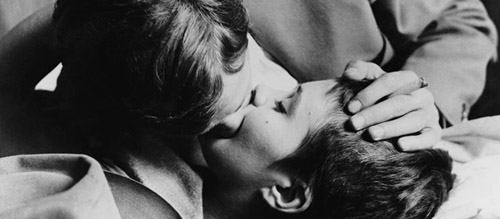
Breathless (1960)
Director: Jean-Luc Godard
Screenwriters: Jean-Luc Godard, François Truffaut
Starring: Jean-Paul Belmondo, Jean Seberg, Jean-Pierre Melville
Jean-Luc Godard’s legend is hard to ignore. Within the canon of great filmmakers of the 1960s and 70s, he is still far and away one of the most recognisable and iconic names, and is known for revolutionising the form alongside the likes of Jean-Pierre Melville, François Truffaut, Agnès Varda and Jacques Demy. Godard’s films Vivre Sa Vie, Bande à part, Le Mépris and Pierrot le Fou remain some of the defining films of the French New Wave and European Cinema as a whole. Godard has influenced countless American directors, ranging from Francis Ford Coppola, Steven Spielberg and Martin Scorsese to more contemporary directors like Wes Anderson and Noah Baumbach.
With his debut Breathless (À bout de souffle), Godard burst onto the scene with a jazz influenced Parisian Noir, which upended many cinematic conventions of the time and was bursting with chic, cool and class. Iana Murray, writing in We Love Cinema, summed up the film’s consummate appeal: “A word that tends to come up a lot when people are talking about Jean-Luc Godard’s Breathless is “fresh.” It’s a strange label for a film that turned 60 this year, yet there’s a reason why we keep coming back to it. Trends come and go, today’s big thing becomes ancient history tomorrow – but Breathless remains a cultural constant”. The film’s staying power is echoed by others in the Wall Street Journal’s 50th anniversary review of the film, where Godard’s fearless nature and rule breaking is also highlighted. Breathless was named the 13th Greatest film of all time in reputable print publication Sight & Sound’s most recent poll from 2012.
The performances are truly magnetic and manage to be standout in a film very much known for its technical achievements and form-shaping creative decisions, with Jean Seberg a particularly stylish and hypnotic presence from her immortal opening screams of “New York Herald Tribune”. Jean Paul Belmondo, who would become a recurring collaborator with Godard on iconic films like Une Femme Est Une Femme and Pierrot le Fou, is terrific and really lights up the screen; he gives Michel a real carefree nature and sense of fun. Belmondo and Seberg have some terrific chemistry and are a constant delight.
Another one of the film’s clear strengths and part of its enduring appeal is its jazz score, arranged by the legendary French musician Martial Solal. It matches the film’s energy and complements its Parisian setting. The score really lends itself to the period the film came out of, the birth of the 60s.
Breathless has been noted for its kinetic energy and radical use of jump-cuts, but it also has lengthy drawn out dialogue in places. The unpredictable nature at its core is one of its defining features and makes rewatches and analysis all the more rewarding, Godard’s subsequent features lacking the sheer recklessness and cheek of this debut film despite being regarded as classics in their own right.
As ever with a Godard film, and many other French films of this era, Paris is at the film’s core and it’s a delight to see it in all its glory with many iconic landmarks on display. Few director’s have captured the essence of cool quite like Godard, and his clear love affair with this most iconic of French cities is absolutely fascinating. The choice of camera techniques was also something that separated Breathless from other films of the time, with the majority of its shots coming from behind, a creative choice that works particularly well for the film’s climactic moments.
Dripping in cinematic references and homages to old Hollywood, it’s clear how much Breathless has influenced not just contemporary filmmakers but many to have presented us stories over the past 60 years. François Truffaut, who drew up the film’s core story treatment based on a man who had killed a policeman and gone on the run with his American girlfriend, was a close friend of Godard’s, and the influence on each other’s work is clear. As a result, Truffaut’s Shoot the Piano Player feels a close relative to Breathless and would make a strong companion piece.
Breathless remains a fascinating work, and although the discourse surrounding it can perhaps be tiresome, it is worthy of its praise. A distinctive work signalling the birth of a genre (and a filmmaker) that would shake the fabric of cinema, it is a vital work within the French New Wave and perhaps one of the best starting points for cineastes looking to delve into a myriad of diverse voices of which Godard forms just a part. Full of frenetic energy and at a brisk 87 minutes, Breathless remains the epitome of cool and its legend sees no sign of slowing down.
22/24

